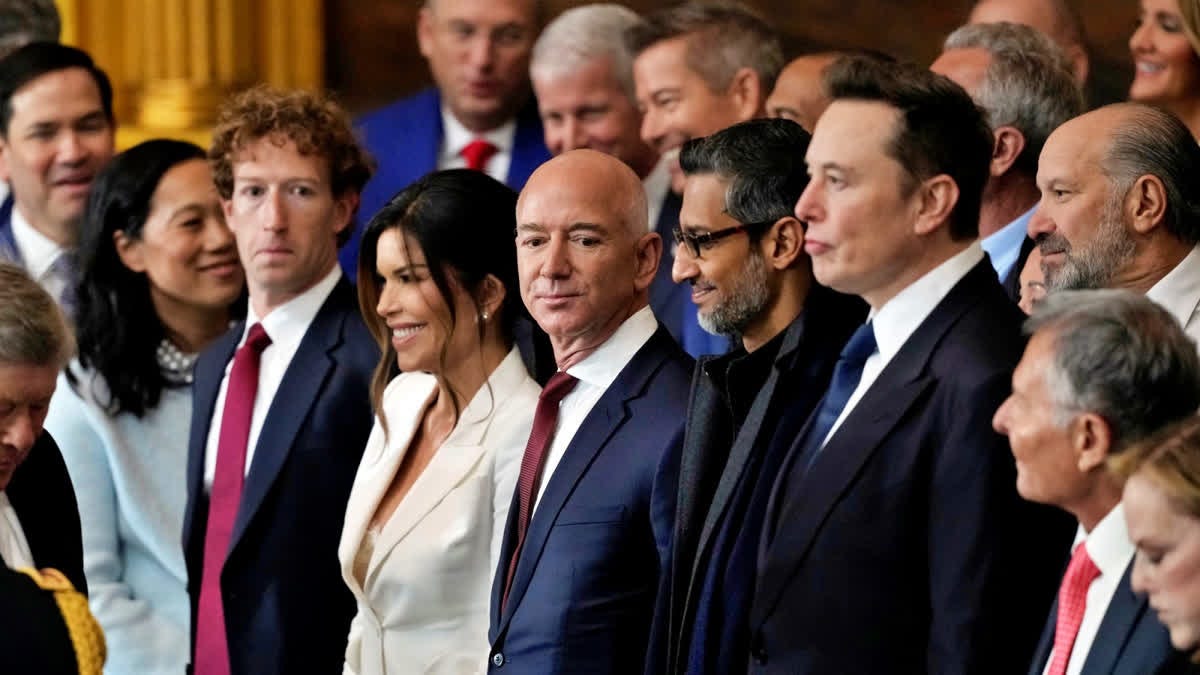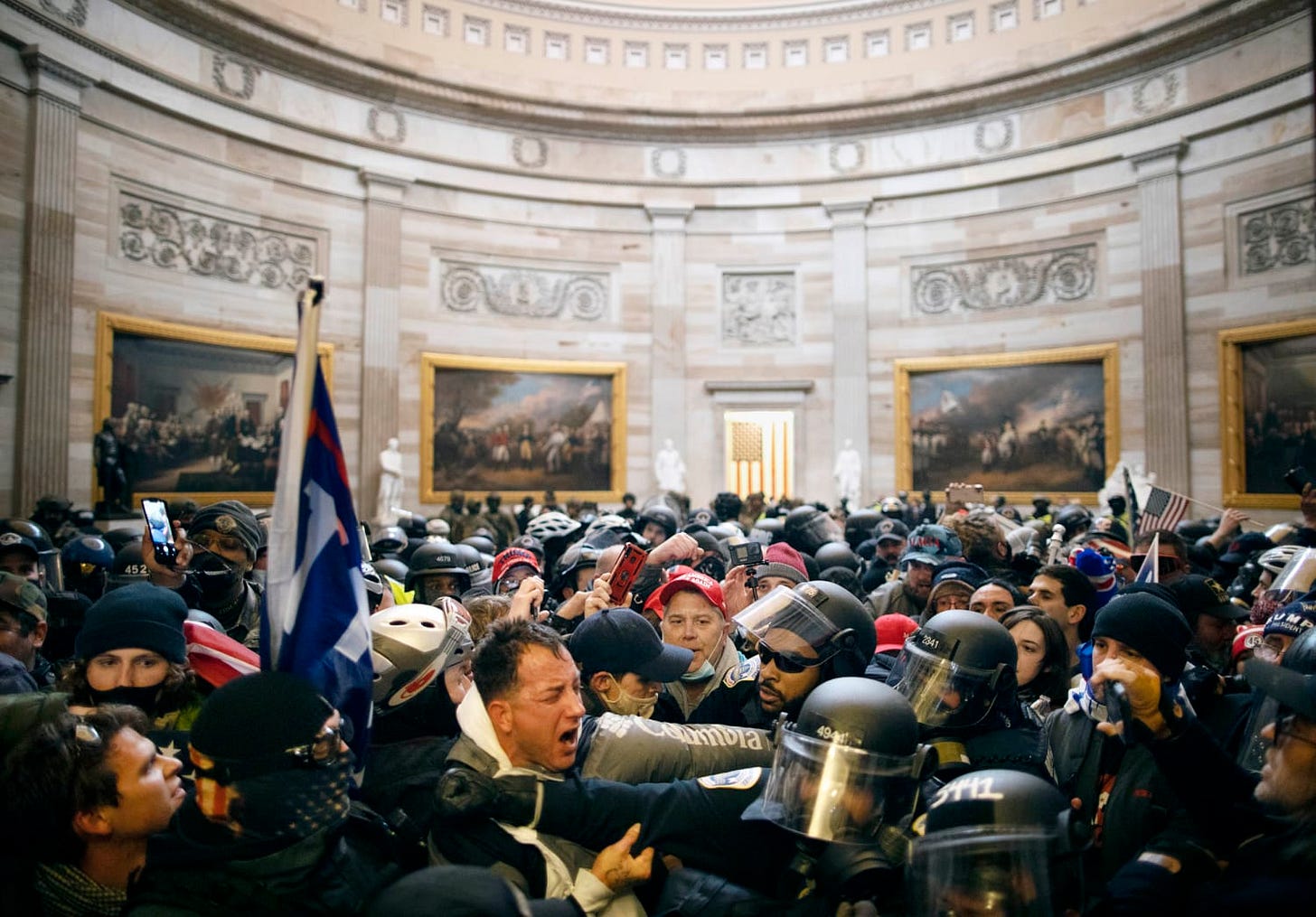Happy Friday!
Well, I say that, but the signature event of the week, Donald Trump’s second inauguration, was a depressing spectacle. Cowardice. Corruption. Cruelty. Cynicism.
On his way out of the door, Joe Biden—who must take a large share of the blame for Trump’s re-election1—warned of a new oligarchy, a return to the era of “robber barons”. This is government by the rich, for the rich. Thirteen of Trump’s cabinet picks are billionaires.
Surely the signature image from the ceremony (apart from Melania’s social-distancing hat and Mark Zuckerberg checking out Lauren Sanchez’s rack) must be the silent phalanx of tech overlords in prime position of the dais.
I think these masters of the universe will come to regret that photo—the ones who still have some self-awareness, that is. It’s too perfect a picture of capital kowtowing to power, in the hope of further enrichment.
Mere Republican governors, meanwhile, were relegated to the secondary seating, underlining just how little Trump still sees himself as part of a wider movement.
***
But the really big grift was elsewhere. Just before the inauguration—ahead of a “Crypto Ball” headlined by Snoop Dogg2—Trump launched his own memecoin, $TRUMP. Someone made a lot of money from this, billions, but its value cratered when his wife Melania also launched her own memecoin, $MELANIA, soon afterwards. Someone made some money out of that, too. The chair of Students for Trump, Ryan Fournier, also plugged a memecoin called $TIKTOK—then claimed he had been scammed, somehow, despite him not being the one to lose money. (He sold his stake as the value crumbled, in what cryptosceptics call a “rug pull,” a move of dubious legality.)
Even the excitable black pastor at the ceremony in the Rotunda, Lorenzo Sewell, got involved. Hours after the inauguration, he got on X to announce that he was investing in a memecoin, too. Jesus notoriously turned over the tables of the moneylenders in the temple, but Sewell told his digital flock: “I need you to do me a favor right now: I need you to go buy the official Lorenzo Sewell coin. I want you to be able to see politics become manifest not just in a way where we’re praying over political gatherings, but we’re seeing us become the hands and feet of the lord Jesus Christ.”

Some of my friends regard these pump and dump schemes as Darwinian tests, but I still feel some sympathy for regular people who let greed overwhelm their common sense. When you see houses on social media you’ll never afford, alongside cars you can never buy, holidays you can never go on, Birkins you wouldn’t even be allowed to hold if you walked in the shop… then no wonder people really, really want to believe they can get rich quick.
One of the reasons I find the MAGA-crypto mashup depressing is because of a phrase that’s been whirling round my head for the last few weeks—it’s easier to con someone than convince them they’ve been conned. All the apex crypto bros have a vested interest in shit-talking the “MSM,” because it says things like “this is clearly a pyramid scheme” and “this ‘investment scheme’ has no value, you’d be better off just tracking the stock market”.
Unfortunately, lots of amateur crypto guys think they’re smart—they know it’s all a con, they just think they are the conmen. Discovering they are the marks instead will be a brutal, but educational, process.
***
Talking of the hated MSM, did you clock how many of the big podcasting lads got invites to the inauguration? Yes, fresh from their objective interrogations of Donald Trump during the election campaign, Logan Paul and Theo Von watched the ceremony as invited guests and clowned around when they got bored3. (Joe Rogan was also there, but being in his 50s he doesn’t have the drive to compulsively broadcast every moment of his life)4.
Slow handclap to the American voters on that one, really. You didn’t like the idea that the liberal media was too cosy with Democrats? Congratulations on your new media, which is either podcasters who are cartoonishly enthused about being close to the Big Guys (Paul and Von) or social media overlords who are visibly deferential to the new regime (Zuckerberg, Elon Musk, Jeff Bezos, Sunder Pichai of Google). Tucker Carlson was there, too, in the front, having thankfully escaped once again from the literal demon that attacks him in his sleep.
In one of my now-rare forays on to X, I saw Politico’s Jonathan Martin offer a good thought experiment, which most of his respondents failed: justify the pardons of those involved with January 6 without reference to the other party5. As in, what’s the active case for doing so, other than “well, Democrats did pardons WE didn’t like” or (less often overtly expressed) “lol let’s trigger the libs”. There were, to be fair, a few genuine offerings arguing that some defendants had received disproportionate sentences. But mostly there was nothing6. Among those who were distressed by the pardons were police officers who were serving at the Capitol that day, and who saw firsthand—and in some cases, were injured by—the violence. They upheld the law, and get slighted. The rioters broke the law, and are celebrated.
Here is what the room where Trump was inaugurated looked like on January 6, 2021:
I have my criticisms of the Democrats but Joe Biden and Kamala Harris turned up to the inauguration this week and listened to Trump trash their legacy. He skulked off to Mar A Lago four years ago when Biden beat him. The parties are not the same.
American politics has regressed, from a rules-based order (however imperfectly expressed) to an older, baronial style. The rules for the next four years are: there are no rules.
Helen

The Origins of Wokeness (Paul Graham)
Is there a simple, principled way to deal with wokeness? I think there is: to use the customs we already have for dealing with religion. Wokeness is effectively a religion, just with God replaced by protected classes. It's not even the first religion of this kind; Marxism had a similar form, with God replaced by the masses. And we already have well-established customs for dealing with religion within organizations. You can express your own religious identity and explain your beliefs, but you can't call your coworkers infidels if they disagree, or try to ban them from saying things that contradict its doctrines, or insist that the organization adopt yours as its official religion.
If we're not sure what to do about any particular manifestation of wokeness, imagine we were dealing with some other religion, like Christianity. Should we have people within organizations whose jobs are to enforce woke orthodoxy? No, because we wouldn't have people whose jobs were to enforce Christian orthodoxy. Should we censor writers or scientists whose work contradicts woke doctrines? No, because we wouldn't do this to people whose work contradicted Christian teachings. Should job candidates be required to write DEI statements? Of course not; imagine an employer requiring proof of one's religious beliefs. Should students and employees have to participate in woke indoctrination sessions in which they're required to answer questions about their beliefs to ensure compliance? No, because we wouldn't dream of catechizing people in this way about their religion.
*
I always enjoy Paul Graham’s essays, although this one is a bit of a busman’s holiday for me—it echoes a program called The Church Of Social Justice I made in 2022.
Graham also points to something I’m obsessed with, but which I have never found the right way to bring alive: the internet caused a massive social shift by moving us from geography-based communities to interest-based communities. Think of all the forums where people found each other based on niche interests that they would never have encountered another person with IRL. I’d argue that changed sexuality, gender expression, political polarisation… and the media. “Unfortunately it turned out that the paper of record was mostly an artifact of the constraints imposed by print,” writes Graham. “When your market was determined by geography, you had to be neutral. But publishing online enabled — in fact probably forced — newspapers to switch to serving markets defined by ideology instead of geography.”
The Social Media Sea-Change (Culture Study, Substack)
I find myself diverting my scroll energy to Facebook, where I still have an account to access dahlia groups, but it feels even more gross than before: a wasteland of AI accounts promising blue dahlias and weight loss reels and suggestions to friends of friends who haven’t updated their Facebook accounts in nearly a decade. It’s like a frat house basement at 10 am. Why the fuck am I here.
[…] I’m not quitting Instagram. I may or may not add email to my phone; maybe I’ll just do it when I’m traveling, and it becomes my de facto computer. I’m not trying to convince you to do what I’ve done, and I’m not suggesting I’m a superior or more disciplined person for doing any of this. All I’m saying is: I think I’ve turned the corner. And I think a lot of you have — or are about to — too.
*
Anne Helen Petersen on falling out of love with social media, aided by “social feeds [that] seemed to finish their years-long transformation from a neighborhood populated with friends to a glossy condo development of brands”.
Quick Links
Sam Bowman and Sam Dumitriu on pro-growth policies (Substack).
“Well-meaning people offered sensible ideas to try to save the playground, but unfortunately they were all bad. They’re worth exploring a little because they say a lot about the disconnect between how people think things like playgrounds are paid for, and cold hard economic reality.” Martin Robbins on what two disused playgrounds tell us about council finances (Substack).
See you next time! If you were forwarded this email and would like to subscribe, click here:
Biden pre-emptively pardoned his siblings on his way out, which I both understand—Trump has made very explicit threats to jail and persecute political opponents—and instinctively hate. Sure enough, one of Trump’s first acts was to pardon 1,500 people over the January 6 insurrection, where a violent mob rampaged through the very room in which he was sworn in as president this week.
In 2017, Mr Dogg called artists who played for Trump “Uncle Toms.”
Was Lex Fridman there? Answers on a postcard. Update: of course he was.
Schadenfreude moment of the week is that human podcast Vivek Ramaswamy has been forced out of DOGE. The final straw was reportedly his mad Christmas tweet about how American culture had been ruined by Saved By The Bell: “A culture that celebrates the prom queen over the math olympiad champ, or the jock over the valedictorian, will not produce the best engineers. A culture that venerates Cory from “Boy Meets World,” or Zach & Slater over Screech in “Saved by the Bell,” or ‘Stefan’ over Steve Urkel in “Family Matters,” will not produce the best engineers.”
JD Vance is on record saying that those with convictions for violence should not be pardoned. Yet they were. There is an obvious difference between Biden pardoning Anthony Fauci, to protect him from spending his golden years in courtrooms facing tedious people who want to turn Covid into a permaculturewar, and pardoning the guys who tried to string up Mike Pence.
In the spirit of objectivity, let me say that most of Trump’s executive order on gender was good. Male rapists should not be in women’s prisons, and anyone who suggests they should be is not a serious politician, they are either a dim ideologue or a hopeless sheep afraid to stand up to donors and interest groups. As for the other EOs, some seem performative (Gulf of America), some are awful (leaving the Paris climate accords), while others seem ill-thought-through, with bad consequences as a result, and likely to get snarled up in litigation (ending birthright citizenship means that if you have a baby while in the U.S. on a legal visa, your child is an illegal alien and must leave the country at 21.) The sheer blitzkrieg of EOs means it’ll take me a while to catch up on them all.







Fantastic newsletter again Helen. The Anne Helen Peterson piece reminds me of this Adam Curtis quote from an interview with Jon Ronson a decade ago: “"I have this perverse theory that, in about ten years, sections of the internet will have become like the American inner cities of the 1980s. Like a John Carpenter film—where, among the ruins, there are fierce warrior gangs, all with their own complex codes and rules—and all shouting at each other. And everyone else will have fled to the suburbs of the internet, where you can move on and change the world. I think those suburbs are going to be the exciting, dynamic future of the internet. But to build them I think it will be necessary to leave the warrior trolls behind. And to move beyond the tech-utopianism that simply says that passing information around a network is a new form of democracy. That is naive, because it ignores the realities of power." Need to rewatch Assault on Precinct 13 soon.
Spent a good thirty seconds researching the countercultural phenomenon "Daliha Groups" before realizing you were just discussing gardening. (Or were you? ;o))
Thanks for the continued excellence and occasional red herring.